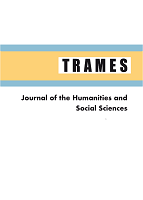USE OF 20TH CENTURY TERMINOLOGICAL LANGUAGE IN THEIR MISSIONARY WORK: THE CASE OF THE EASTERN TURKI
USE OF 20TH CENTURY TERMINOLOGICAL LANGUAGE IN THEIR MISSIONARY WORK: THE CASE OF THE EASTERN TURKI
Author(s): Fatih Erbay, Enfel Doğan, Murat Ali KaravelioğluSubject(s): Lexis, Biblical studies, Sociology of Religion, Turkic languages, Phraseology
Published by: Teaduste Akadeemia Kirjastus
Keywords: missionary texts; Jesus; Apostles; Bible; Eastern Turki;
Summary/Abstract: Swedish missionaries, through the ‘Swedish Mission Press’ established in Kashgar, East Turkestan, published numerous works from the early to mid-20th century in Eastern Turki to introduce Christianity to the Muslim Uyghur community. There are several particular features in the language and style employed in these works. This study aims to examine the terms used to express concepts related to God (the Father and the Son), the Bible, the Apostles, Jesus’ disciples, and ‘belief in God’ in eleven books published by Swedish missionaries in Kashgar to promote Christianity. The study concludes that Arabic and Persian terms related to Islam, which are easily understood by the Muslim Uyghur community, are frequently used in these works to introduce Christianity. This choice demonstrates that concepts already familiar to the Muslim Uyghur community are deliberately utilized in explaining and promoting Christianity.
Journal: TRAMES
- Issue Year: XXIX/2025
- Issue No: 1
- Page Range: 79-104
- Page Count: 26
- Language: English

